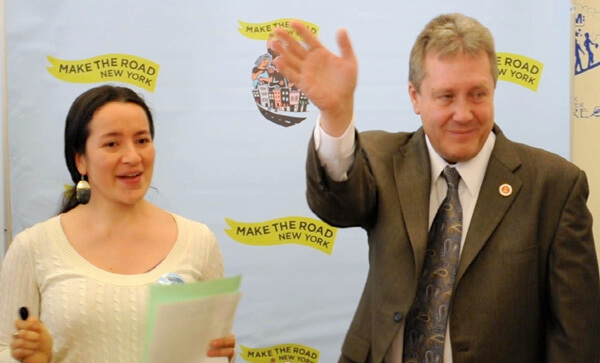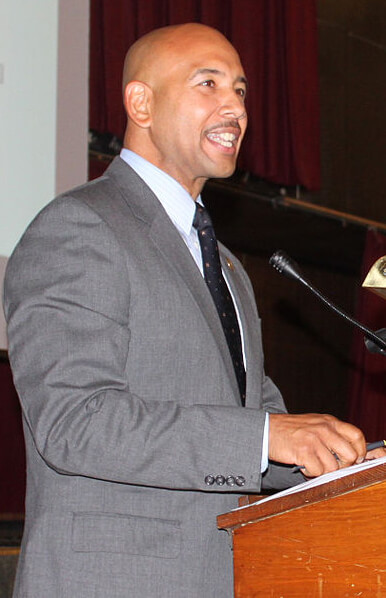Victor Manuel Aguirre and Fernando Urias in Cristina Herrera Borquez’s “No Dress Code Required.” | OUTSIDER PICTURES
The road to same-sex marriage was fraught with obstacles, but the setbacks faced by Victor Manuel Aguirre and Fernando Urias, a couple in Baja California, Mexico, were beyond the pale. Same-sex marriage was legal in some states in Mexico when this long-term couple wanted to wed. However, in Mexicali, where Aguirre and Urias lived, the local government prevented such marriages. Even after a lawyer filed an amparo (a constitutional appeal) demanding equality, Aguirre and Urias had to endure a lengthy and ugly battle — including a bomb threat at the courthouse on one of the days planned for their wedding.
“No Dress Code Required” is director Cristina Herrera Borquez’s inspiring and moving documentary — it’s impossible not to cry happy tears at the men’s wedding — that recounts these unlikely activists as they prevailed, fin ally getting hitched after more than a few hitches along the way.
Cristina Herrera Borquez documents two Mexican men’s fight to get married
Borquez translated for Aguirre and Urias, at points summarizing comments from both of them, in a conference call with Gay City News about their film and story.
GARY M. KRAMER: Cristina, how did you find this story, and what prompted you to follow it and film it?
CRISTINA HERRERA BORQUEZ: I’ve known them for years in passing. I knew Fer better; he was my hairdresser. We have a dear friend in common. Fer told me years ago he wanted to get married and he knew it was not possible. When our mutual friend said the guys were getting married, my friend said we have to document this. I said I’d talk to them to see if they wanted to do it. We talked, they said yes, and we started shooting in June 2013. I finished the last interview in March 2016.
GMK: Gentlemen, how long have you been together, who proposed, and how long did it take for you to get married?
FERNANDO URIAS: We have known each other 14 years. Victor did the proposing around three years ago. The start of the legal process to the end took two years.
GMK: Gentlemen, you became accidental activists. Were you prepared for such a drawn out battle? What surprised you during the process?
CHB: They know they are activists by accident, but it was because of the needs of the LGBTQ community where they live. They really had a need to have their rights respected, and no one was doing that legally.
GMK: You keep your cool despite the many indignities and impediments you encounter. Was there ever a time during this war of attrition that you wanted to give in?
CHB: There were a lot of times where one or the other wanted to throw in the towel, but it was Fer who said, “No, we have to get up and do this.” It was Fer who was the strong partner, and Victor who was the emotional partner. Even now, they are a couple that complements each other in that sense.
GMK: Cristina, how do you think this story and your film help raise awareness of other LGBTQ issues? There is a sound bite from a woman who says gay marriage is fine, but adoption: No!
CHB: When I started doing this film, my main point was to raise awareness to make not only heterosexuals but even those in the LGBTQ community look at their rights and how they have to fight for something people take for granted. It went beyond that legal struggle.
Now that people are seeing the film, I’m getting feedback from people who are LGBTQ and who are not, and heterosexuals who really have very little tolerance for a different lifestyle can relate to this story and see love and see someone’s rights being completely violated. It can happen to them because Mexico is such a corrupt country. We have to fight for our rights every single day. The film makes people more in tune with someone they never thought they’d be in tune with.
GMK: Gentlemen, you are respectful even toward your detractors. Can you talk about managing the stress of your experiences?
CHB, VICTOR MANUEL AGUIRRE, AND FERNANDO URIAS: We have had to go through red tape for everything that has to do with our rights all our life. It was frustrating that every time they asked for something they would have to go through hoops when they were entitled. They had to fight for the same right that everyone else has. It was even harder. It was not just the premarital talks that were an issue, it was every other item on the to-do list. It was extra hard because it was how they were being asked. It’s important that people see this documentary so others can see what was happening at that time in our city. Eight same-sex couples have gotten married after them. It is still not legal in Baja California. Couples still have to go through the legal process [filing an amparo].
GMK: What kind of support — or detractors — have you received as your story got media attention?
CHB, VMA, AND FU: The visible support that you see in the film is of people mobilizing in marches. But Fer had a group of ladies praying outside his salon for him to “get better and not get married.” He’d have to tell them to take their prayers somewhere else. Someone in City Hall hired a private investigator to follow the guys around. But he wasn’t good; he was very obvious outside their home and business. He was supposed to find something that would demonstrate that Victor and Fer were evil people.
GMK: Where did you gentlemen honeymoon?
VMA AND FU: We went to Cancun!
CHB: I was invited, but I didn’t go!
NO DRESS CODE REQUIRED | Directed by Cristina Herrera Borquez | Outsider Pictures | In Spanish with English subtitles | Opens Nov. 3 | Village East Cinema, 189 Second Ave. at E. 12th St. | citycinemas.com/villageeast

































